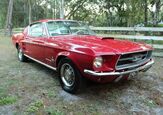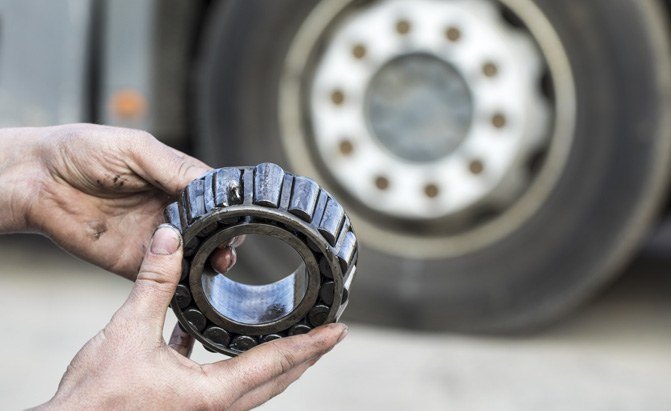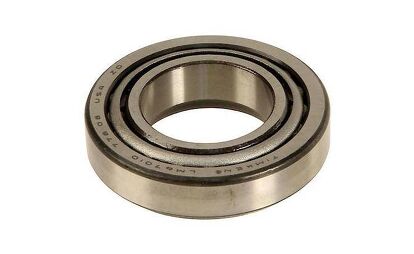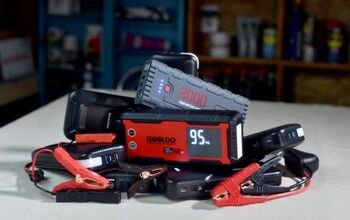The Best Wheel Bearings To Get Rid of That Wheel Whirring
If you’ve spent many years owning a car or truck, especially one that’s out of warranty, you’ve probably heard the song of the wheel bearing. A roar, like some sort of helicopter, following you closely and changing both pitch and volume with your speed. Drive straight or turn lightly in one direction and it’s there, turn the other and it’s gone? Or maybe you’re just feeling something a little bit loose in the steering? Either way, these could be signs of a bad wheel bearing. It’s not a repair you can put off, but with dozens of different brands to choose from, which one is right?
We’ve partnered with Advance Auto Parts for a look at the best brands when it comes to wheel bearings, to help point you in the right direction.
Table of contents
ACDelco
ACDelco is the parts side of General Motors, which means their parts offer the same level of quality that your car, truck, or SUV would have had when it left the factory. While ACDelco handles original equipment components for GM vehicles, they also supply parts for other types of vehicles, leveraging their manufacturing capacity and expertise. Plus, many ACDelco wheel bearings come with a lifetime replacement warranty, which shows confidence in their products.
ACDelco uses original equipment-quality rollers, seals, and grease inside the bearings as well as ensuring proper tolerances and fit for the whole assembly, and ACDelco bearings meet factory requirements for stiffness, which can greatly affect ride and handling. They also include items like wheel speed sensors, which contain sensitive electronics where top quality is important to the function of features, ranging from your speedometer and anti-lock braking system to even emergency driver assistance tech.
Pros | Original equipment quality |
Cons | Original equipment price |
Beck/Arnley
Beck/Arnley has been supplying parts for vehicles since 1914, transitioning from motorcycles to cars following World War II. They originally specialized in parts for import brands, normally from Europe, and that area continues to be their specialty. With parts running from automotive fluids to sensors and everything in between, they know how to meet and exceed original equipment standards for European cars. Beck/Arnley matches the original equipment part in size, form, function, and fit—sometimes sourced from the same plant that made it for the manufacturer.
Their bearings are similarly high quality, offering up to a three-year replacement warranty. Equally importantly, their bearings come with everything you need to install them properly. That means ABS rings or sensors as applicable, and an axle nut if the vehicle needs one to be replaced with the bearing. European cars are notorious for changing sizes and parts midway through the year, but rather than a one-size-fits-all approach, you can be sure Beck/Arnley will have the right part.
Pros | OE-level replacement parts for foreign cars |
Cons | Parts library includes mostly foreign cars |
MOOG
MOOG is one of the biggest suppliers of aftermarket chassis and suspension parts in the word. Wheel bearings are one of their specialities, and as a company that focuses on aftermarket products, they also know how to deal with original parts that have common defects over time.
Starting with a rolled form design that ensures proper preload of the bearing, they also have a quad lip seal design on sealed bearings to help make sure contamination and corrosion are kept out. The wheel studs come with a protective coating to make sure that they torque smoothly and easily when it's time to reinstall your wheels. ABS and sensor wires are protected with an abrasion-resistant material (where applicable) to protect from adverse effects. MOOG claims to offer more coverage of makes and models than any other aftermarket supplier, ensuring that they have the parts you need. That includes the latest models and generations as well.
Pros | Massive catalogue, wide availability |
Cons | Not an original equipment supplier |
Timken
Unlike the other manufacturers on this list, who make, buy, and sell nearly every part offered on a vehicle, Timken does bearings and only bearings. That level of specialty means they know exactly what they're doing when it comes to bearings. More than just wheel bearings for cars and trucks, they build bearings for food processing plants, for wind turbines and power generation, for rail, agriculture, and machinery. Even aerospace applications are on their list.
As a result, Timken has worked with original equipment manufacturers for more than 100 years to help them design wheel bearing, and offer products that have been thoroughly tested against water, dust, mud, salt, heat, and the cycling environmental conditions that can affect your car's components. Timken's parts are made from super-clean steel for added reliability, with precise profiles for the bearing parts themselves to reduce stresses and increase life, and with finishing processes designed to make smoother friction surfaces in order to help increase fuel efficiency.
Pros | A bearing specialist, they know how to make the best components |
Cons | Fewer applications than some on this list |
Driveworks
Sometimes getting the part with the three-year warranty and the three-times price doesn't make sense. Sometimes you just need a part that will do the job for a reasonable amount of time for a reasonable price to get you back on the road. It could be because you're short on cash or because maybe the rest of the vehicle just isn't worth the money anymore. There's nothing wrong with wanting a bargain, but we understand you don't want to sacrifice quality just for a good price. In which case, Driveworks bearings may be just the thing you’re looking for.
Driveworks is Advance Auto's store brand, which means that there's one less step in the process between the factory and you, which helps keep prices down. The bearings are still designed to match OE fit and function, and are constructed from high-quality materials, but thanks to being an in-house part and offering a shorter warranty, the price to consumers comes down. For many DIY mechanics, that's exactly the balance they're looking for, allowing you to get your car back on the road quickly, safely, and affordably.
Pros | A low-price, but high-quality option |
Cons | Shorter warranty than more expensive brands |
What Wheel Bearings Do
A wheel bearing is one of the most important parts of your car, because it's the part that holds the wheel in place while letting it turn. Held firmly into the suspension on one side, and holding the brake rotor (or drum) and wheel studs on the other, the bearing has three main part: the outer race, which attaches to the suspension, the inner race, which attaches to the wheel, and the bearing itself. The bearing itself (in auto applications) is usually made up of many small metal cylinders, called rollers. Held in place by a thin metal cage, the rollers roll inside the cage, with the outer race stationary on the outside and the inner race turning with your wheel. The dozens of rollers support the weight of your vehicle while allowing rotation.
Wheel Bearings vs. Hub Assembly
Originally, automotive wheel bearings were made up of just the bearing itself, but with more modern vehicles, disc brakes, and front-wheel drive, that's changed. Today, most wheel bearings are contained in a larger assembly called the wheel hub bearing assembly. Because you can't replace just the bearing part of this assembly, which usually also holds the wheel studs and electronic sensor components, the hub assembly is usually still referred to as the wheel bearing.
Older wheel bearings where the bearing was separate needed to be repacked with grease on occasion, as well as having their fastening bolt tightened as part of the maintenance process. Modern bearing assemblies are normally sealed and require no maintenance.
Why Do Wheel Bearings Wear Out?
Mounted low on your vehicle, and covered in rain, dust, dirt, and salt, even the best sealed bearings can eventually allow contaminants inside the seal. Even if the seal isn't breached, however, over time the grease inside the wheel bearing can break down and lose its lubricating properties. When either of these things happens, heat and friction are increased inside the bearings, leading to wear, further damage, and then more wear.
Eventually, the roller bearings either lose their shape or even fall out of place, and if allowed to go on long enough, the hub can detach from the suspension. But don’t worry, normally, they'll give you plenty of noise and vibration long before that happens. Damage from improper installation (using a hammer on the bearing), impacts with curbs and potholes, and aftermarket modifications like larger wheels can all lead to premature failure as well.
How Do I Know a Wheel Bearing Has Gone Bad?
A humming or growling noise that gets louder and higher-pitched as you accelerate is one of the classic tells. Especially if that noise goes away when you turn lightly in one direction. Play in the steering can also be a sign, along with a vibration in the steering wheel that follows the noise. ABS malfunction lights can be a sign of a wheel bearing failure as well, but would need to be verified using a code scanning tool. Jack up the wheel and push on the top and bottom of the tire. If there's movement in the wheel, it’s a good sign of wheel bearing failure.
We are committed to finding, researching, and recommending the best products. We earn commissions from purchases you make using the retail links in our product reviews. Learn more about how this works.
Main photo credit: Kot500 / Shutterstock.com
Evan moved from engineering to automotive journalism 10 years ago (it turns out cars are more interesting than fibreglass pipes), but has been following the auto industry for his entire life. Evan is an award-winning automotive writer and photographer and is the current President of the Automobile Journalists Association of Canada. You'll find him behind his keyboard, behind the wheel, or complaining that tiny sports cars are too small for his XXXL frame.
More by Evan Williams







































Comments
Join the conversation